Which Is the Better D&D Campaign Setting: The Rings of Power or House of the Dragon?
An unbiased, scientific assessment
Photos Courtesy of Prime Video, HBO TV Features dungeons and dragons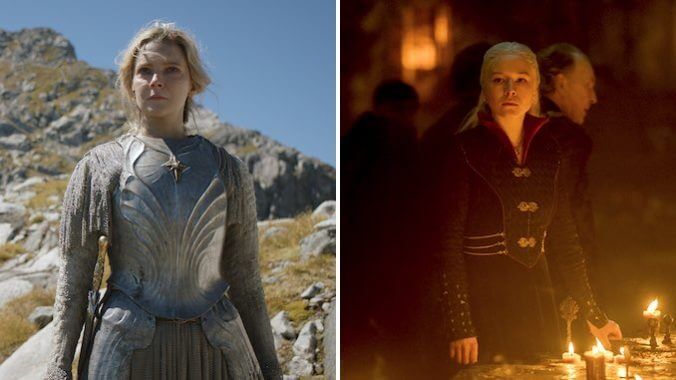
As I’ve written here for Paste before, there are many important questions one might ask when assessing a new fantasy television series. But the important one remains: Is it some good Dungeons & Dragons? This fall has been a particularly lively time for lovers of fantasy TV, with both Amazon’s Lord of the Rings-prequel The Rings of Power (which just pries the property further out of the Tolkien estate’s grip) and HBO’s Game of Thrones prequel House of the Dragon.
Unlike The Wheel of Time, neither show provided much in the way of your traditional roleplaying game story structure: We’re not really concerned with traveling groups of adventurers on an epic quest, or at least, not in a way where they all share the screen at the same time while going to the same place. It’s still highly likely that a lot of hopeful dungeon masters are going to be inspired to set their next campaigns in these worlds—or similar ones with the serial numbers filed off. But which one is more conducive to setting your adventure?
With your game design convenience in mind, I’ve put these shows head to head in a competition spanning multiple categories to answer that very question, dear readers. May the valar preserve us and the gods be good.
![]()
Most Stress-Inducing Opening Exposition
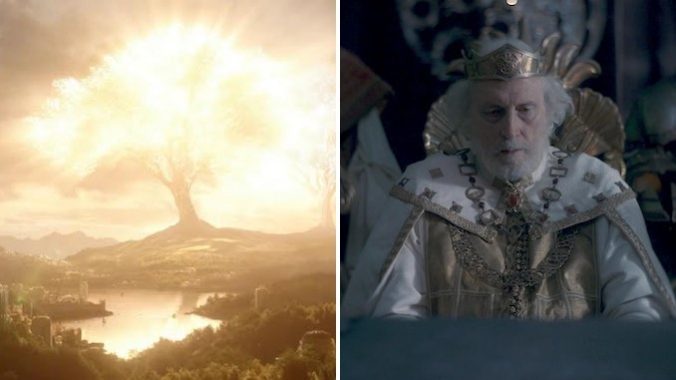
The dungeon master’s job is a tricky one: Make a world complex and interesting enough that players want to get lost in it, but don’t slather it on so thick that they feel unsure of how they could possibly fit into the narrative. This inevitably leads to a Session Zero where the DM sits on one side of the table and talks straight-facedly about a completely insane backstory as if this is all the most normal thing in the world, while players stress about the fact they rolled a firbolg in a world where the DM has declared that whole species extinct. Therefore we ask: Which show’s story opens with the most alarmingly complicated exposition, from the standpoint of the layperson?
Rings didn’t come to play in this category: Its opening montage lasts more than seven minutes, and features weird names, a CGI world map, and oblique references to stuff like the trees that lit the world before there was even a sun.
But we need to respect that Dragon also brought its A-game, with chyrons about history so potentially confusing, that part of the chyron even fades out so that it just informs you how many years before Game of Thrones the show takes place. Worse yet for potential players is the dawning realization that this is to be a campaign setting about palace intrigue, with more diphthongs than dungeons by far.
Winner: House of the Dragon
Best Worst Accent
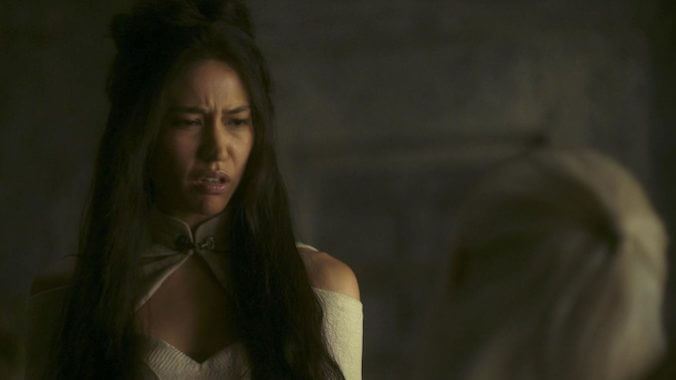
Every player gets into character in their own way when it comes to tabletop gaming. Some folks never speak in their character’s voice, preferring to talk in the third person while describing their character’s actions or paraphrasing their dialogue. Others go all in. What everyone can agree on, however, is this: The very best RPG character performance hinges on its player doing the absolute worst, most grating accent possible. Which world provides better justification for this behavior?
The Rings of Power really falls flat in this regard, I’m sad to say: While there are numerous accents on display here, none come anywhere close to grating on the nerves. It all reeks of trying too hard. Rings didn’t even show up to the game on this one.
Mysaria, on the other hand, is a character in House of the Dragon.
Winner: House of the Dragon
Best Horse Girl
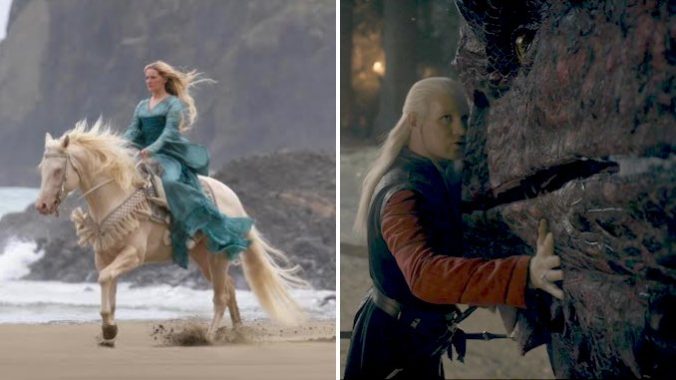
Fantasy games and storytelling are many things to many people, and we should never allow gatekeepers to make them exclusionary. That said: Fantasy is, has always been, and will always be first and foremost for horse girls. As a sword guy, I have struggled with and inexorably come to accept this truth. We therefore must ask whether the milieu of Rings or Dragon is the better playground for the horse girl.
Rings comes in as a strong contender with its one flagrant, nonsequitur moment of equine-affinity. Galadriel gallops across the fields of Numenor, her golden locks trailing behind her, thrilled by the bond between herself and her horse.
Doubtless, some will point out that Dragon has few horses in it, and I feel this is very rude when Syrax and Caraxes are right there. Indeed, the loyal steeds of Dragon are said to sleep in the cradles beside their future riders. Shouldn’t we acknowledge the better horse girl in this case? The character who mounts a steed and comes into battle, blond locks flowing behind?
I am referring, obviously, to Daemon Targaryen, clearly the best horse girl between the two shows.
Winner: House of the Dragon
Best Questionable Plan That Worked Because the Player Rolled a 20
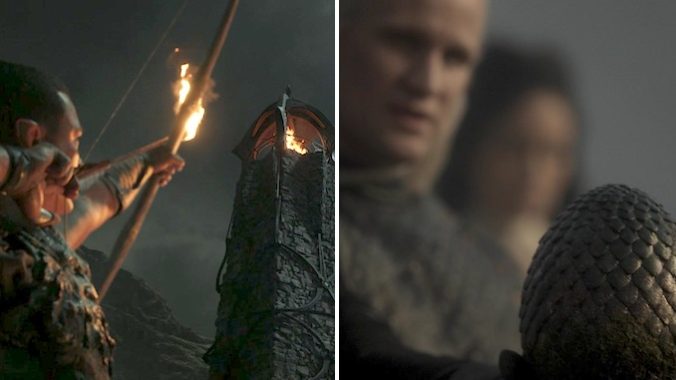
Tabletop gaming is a special brew that brings together the world envisioned by the gamemaster, the characters dreamed up by the players, and the unholy alchemy that happens around a table when you and your friends start rolling dice that could dictate almost anything. And so, one key judgment on which of these worlds feels most suited to a gaming campaign has to be how well their own narratives account for total bullshit that probably shouldn’t have worked.
One stellar example we have is Arondir’s gambit at the old fortress in a late episode of Rings. Having escaped from the enslavement of Adar and his orcs, Arondir returns to Bronwyn and the people of the Southlands with a warning about an impending attack. It looks like they’ll attempt to use the fortress—this would be the place with stone walls and defensible turrets, a place designed to withstand siege—as their digging-in point. But Arondir has other ideas, using trickery to draw Adar’s forces in and then some fancy elvish archery and gravity to flatten a bunch of them with falling scenery. Should it have worked? Absolutely not! But it’s exactly the sort of thing a DM will let slide because it’s 11 p.m. and everybody has work or school tomorrow.
Dragon, meanwhile, is not to be outdone. In Episode 2, Daemon decides to nudge Westeros up toward civil war by occupying one of Viserys’ strongholds and basically stealing the dragon egg there: The kind of thing somebody does when they really want to start shit. Just as it looks like he’s about to send his brother’s armed emissaries back home with the dire news that the conflict has escalated, Rhaenyra shows up with her own dragon and, with a single Charisma (Intimidation) check, gets Daemon to back down and relinquish the embryonic air of superiority he has so daringly taken.
In deference to the wisdom that one should always, always max out speech-related skills, I have to reward the world that lets Rhaenyra flourish.
Winner: House of the Dragon
Most Committed Conlang
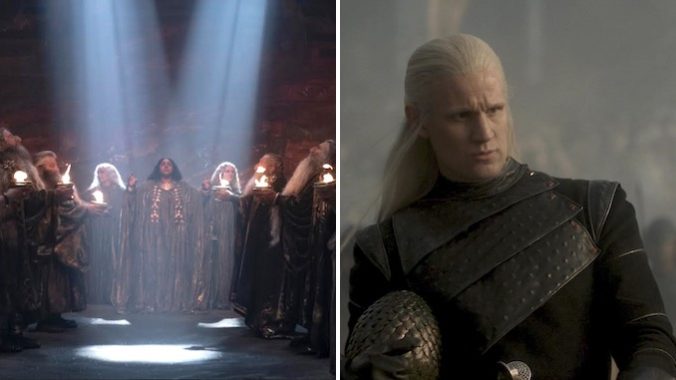
A “constructed language” is any language that emerged not from the natural processes of human history—with its tides of conflict, memetic mutations, push-and-pull of colonization and diaspora, or changes wrought by the rise of printing presses and broadcast media—but from a funny little guy making shit up. Few indeed are the gamemasters who go to such lengths in their own campaigns, so it’s a privilege to consider playing in the worlds of Tolkien, with his multiple permutations of elvish, and Martin, whose characters’ use of Valyrian makes them sound like they’re annoyed they aren’t banging vampires right this second.
Valyrian has the cadence and the funky pronunciation of a real language, and the characters deliver it with convincing fluency when they go all-in on subtitled parts of Dragon. It seems like they had committed dialogue coaches doing a great job with committed actors.
It’s tempting to award the dark horse (dark dragon), but there’s a reason J.R.R. still rules the roost here and probably always will. There are by my count at least three conlangs kicking around Rings, filled out and defined to a degree almost no other fantasy story ever has since. No upsets in this category.
Winner: The Rings of Power
Most Overpowered Character Origin
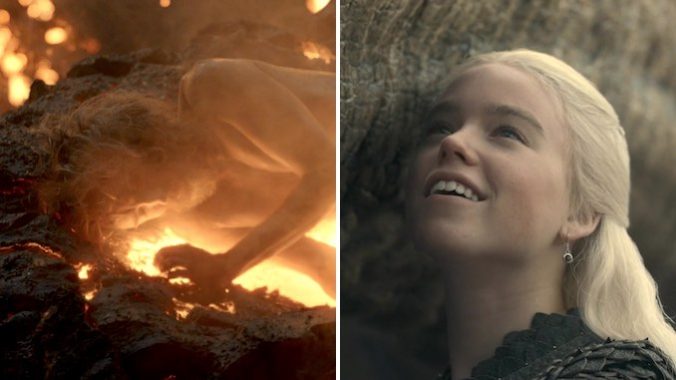
A great campaign setting is one that asks players the question: “How overpowered a character can you get away with creating and have them still fit into the narrative?”
I haven’t heard much of the typical, unbearable teeth-gnashing and garment-rending about Dragon and its women-led narrative from the usual suspects out there, and I suspect it’s because the show appeases this demographic by regularly shredding female bodies for cheap pathos. I’m not saying Rhaenyra is a “Mary Sue,” but that if she were in a Star Wars show, people would be howling about her being one: She has total control over a dragon that slept in her crib while she grew up in her palace as the spurned heir of a kingdom that now must turn to her for guidance during a backstabbing succession war!
And yet, Rings has to take the crown on this one: “The Stranger” (who is Maybe Gandalf? I’ll bet he’s Gandalf!) literally falls out of the sky in a halo of fire and comes pre-packaged with a full spell loadout. He’s barely verbal so he doesn’t need to roleplay at all! This, my friends, is how you introduce a character after the one you were playing earlier in the session died and there’s still two more hours left.
Winner: The Rings of Power
Best Romanceable NPC
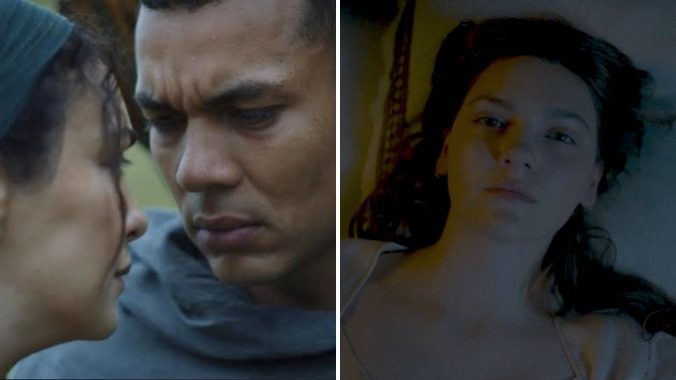
What, at base, is D&D? Is it a tactical game about character building? An immersive roleplaying exercise in character interaction?
No! It is a chance for the players to hit on the gamemaster’s thinly drawn ancillary characters. We must ask ourselves which of these worlds gives us juicier options in this regard.
Surely, Dragon would win if the only question were quantity: Like its forebear Game of Thrones, House of the Dragon is all about death and boobies. Characters get to know each other in this world, and you doubtless must think I plan to award the flowery crown to the reluctant but tender Ser Criston, the ill-fated Joffrey, or poor Mysaria and her accent.
The trouble is that while Rings didn’t bring as many romance subplots to the table (and, as usual, zero sex—this being based on Tolkien), it brought the best option bar none. Here’s the big spoiler, folks: Galadriel’s human pal Halbrand is actually Sauron in disguise, and his absolute glee at seducing the elf princess is one of the best parts of the show. Letting the party hit on the Big Bad is the stuff of legendary game sessions.
Winner: The Rings of Power
Most Lovingly Explicit Violence
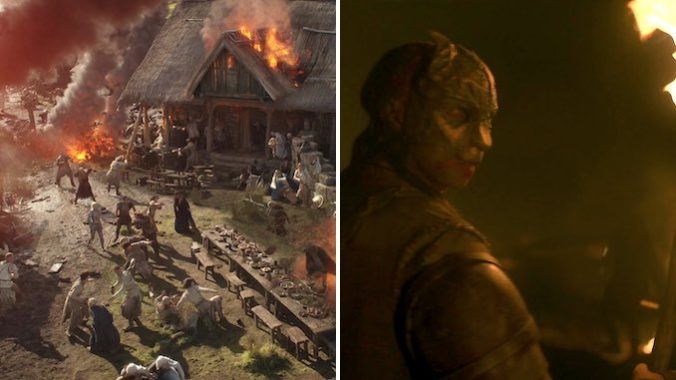
The most important tool any player or gamemaster brings to a tabletop roleplaying session is their imagination! Especially when it comes to describing the gnarly demise of an enemy. It has become standard practice now for your friendly neighborhood DM to ask, once one of your attacks has reduced an enemy to 0 HP, “How do you want to do this?”, as a prompt for you to describe your character committing acts that would cause a juror at the Hague to puke. So, which show’s horrific violence is more lovingly explicit?
Dragon brings us plenty of pulped heads, shores of bodies devoured alive by crabs, and the bisection and lurid viscera of the Crabfeeder himself. But you know what? It’s the easiest thing in the world for a dungeon master to describe every death like the bodies of the people who inhabit their game world are filled with 200 liters of highly-pressurized Ragu. Far more artful is a description of an enemy’s destruction that isn’t gory, but nevertheless unforgettable.
Thus, I have to give it to Maybe-Gandalf’s defeat of the servants of Sauron in the final episode of Rings. Annihilating your enemies in a wash of light that renders them down into moths is not only deeply embarrassing for them, but so profoundly on the nose that it is kind of bemusing.
Winner: The Rings of Power
Best Dungeon

Obviously, we can’t judge whether either of the worlds of these shows is the better D&D campaign without assessing which has the better dungeon and/or dragon, can we?
Unfortunately, neither show really has a dungeon, per se. (Khazad-Dum doesn’t count as it is pre-dungeon! Any carceral facilities in House of the Dragon similarly miss the point and definition of this term!)
Winner: Forfeit
Best Dragon
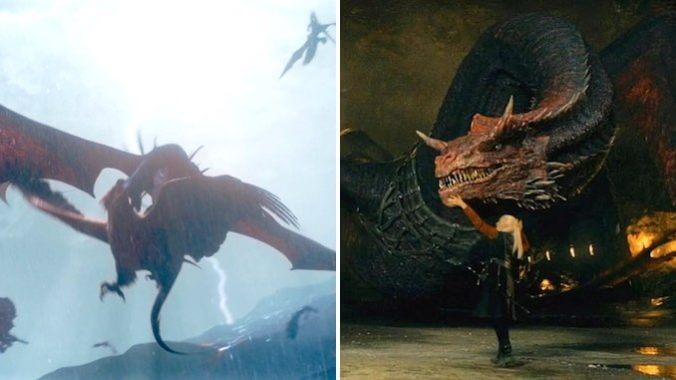
See above.
The Rings of Power does come out of the gate with some strong saurian representation, with an Episode 1 opener full of heavy metal album cover battle that features dragons clashing in the sky and crashing screaming down into blood-soaked battlefields. After that, though, winged lizards are pretty much absent from the narrative. It should be no surprise that House of the Dragon, with the word in the title and a narrative with named drakes that have their own personalities, takes home the gold on this one.
Winner (somewhat unsurprisingly): House of the Dragon
Overall Champion: House of the Dragon
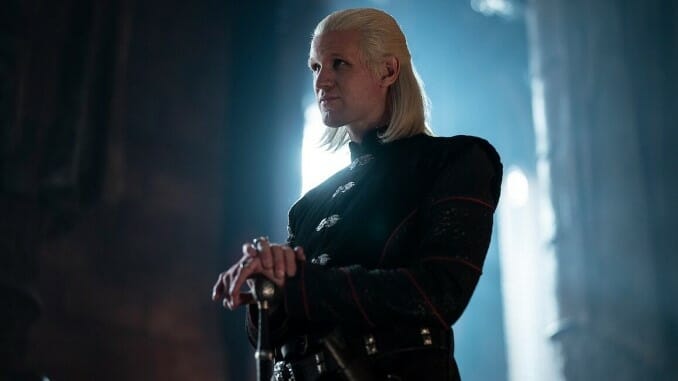
House of the Dragon narrowly ekes out a victory here, taking just one category more than The Rings of Power. Surely some will cry foul, for how could this beat out the very world that gave rise to D&D-style fantasy? The answer is simple: No carefully constructed campaign setting ever survives contact with the enemy players. If you’re going to set your next campaign in a multilayered world full of magic and intrigue, ask yourself: Which one will seem more fun when the players wreck the place? When you get right down to it, isn’t that what matters most?
Kenneth Lowe has been awake since before the breaking of the first silence. You can follow him on Twitter and read more at his blog.
For all the latest TV news, reviews, lists and features, follow @Paste_TV.